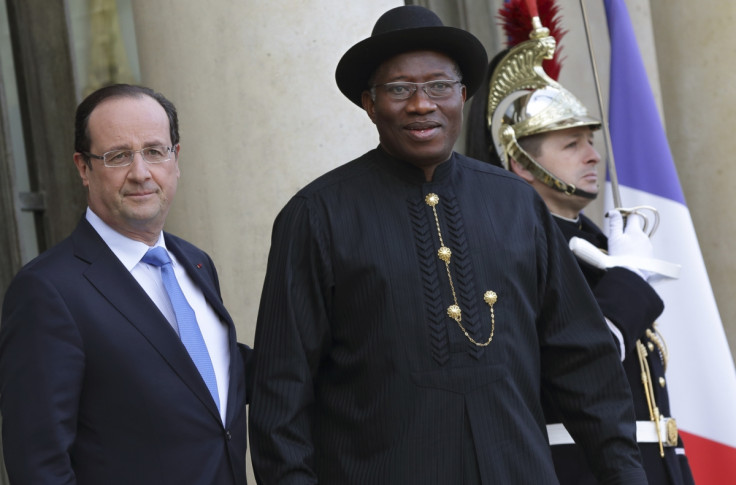Boko Haram Schoolgirls Kidnapping: Nigeria, not London is to Blame

Emily Dugan for Britain's I newspaper, reported from Nigeria on 17 May 2014, on the disappointment felt by parents and their disbelief in the explanation given, for the non-appearance on Friday of President Goodluck Jonathan. The President had been scheduled early on 16 May, to meet all the parents who were able to attend, outside the burnt out remains of the school from which a reported 276 (though one Nigerian website puts the figure at 320) of their girls had been kidnapped by the Islamist terrorist group Boko Haram, a name which roughly means "Western education is sin".
It was from the Chibok Girls Secondary School in Borno State that the Boko Haram militants, wearing what appeared to be military uniform and claiming to having been sent to protect the girls, lined their captives up in the school yard on 14 April, prior to loading them on to trucks and taking them away. Before leaving with the girls, the terrorists also killed a number of innocent bystanders in the town and set several buildings alight.
There appears to have been more girls than usual at the school on the night of their kidnap, as many had come to prep for exams. A number of sinister reports have been made to the effect that the authorities in the area, including teachers, had been warned that something of the kind was about to take place and kept their daughters at home. Whether this is true or not, it is a clear indication of the broad mistrust in which those in authority are held.
Over 50 of the girls managed to escape their ordeal in the few days after their abduction, all using their own initiative and to date, over a month later, none have been freed due to any effort of the Nigerian Government.
Some of those girls were waiting for their President along with their parents in this remote and poor part of the country. Parents and daughters will be most unimpressed that President Jonathan did not feel it safe enough to make the visit.
After some time waiting for their Head of State, the school's principal, Ms Asabe Kwambura, got a call to say that after four soldiers had been killed near the town a few days previously, President Jonathan would not be coming and instead would travel to Paris (a day early) to attend a meeting with other West African and European leaders to discuss and find a best way to resolve the situation.
Making matters worse, was the statement, four days after the seizure of the girls, made by Major-General Chris Olukolade, that most of them had been rescued – a statement which had soon to be retracted because the authorities in Borno State said it was untrue – and the President did not make any comment or express any sympathy whatsoever for the victims and their families for over a fortnight.
This attitude by the President is hard to understand because earlier on 14 April, it is almost certain that members of Boko Haram were responsible for setting off bombs at one of the major bus stations in the capital, Abuja. The explosions killed 71 people and injured hundreds of others. President Jonathan later visited the scene and commiserated with the victims.
It is quite likely that by now many of the girls will have been split up into smaller groups and been dispersed over a wide area, though it is thought that a sizeable number will still be hidden in the nearby Sambisa Forest.
The Nigerian Government has been widely attacked in the country for its handling of this crisis which has been brought to the attention of the world through the constant demonstrations, particularly by women determined to make their voices heard. There is concern that the Government and Military, until now at any rate, have been incompetent and lacked the will to take on Boko Haram and display an attitude that amounts to an abnegation of their duty of care for the public in general and the poor and weak in particular.
On 12 May, the libertarian editor of Spiked-online, Brendan O'Neill, blamed the rise of Boko Haram and so its ability to kidnap the schoolgirls, on Britain's Prime Minister, David Cameron. This was due to the part played by Mr Cameron in the downfall of Colonel Gaddafi.
In bringing down Africa's "King of Kings", Libya descended into chaos and regrettably, as we all know, the new Government in Tripoli has since been unable to establish its authority on most of the country. The Colonel's several armouries have been raided and the weapons sold to whatever group of terrorists can afford to purchase them.
Although one can see Mr O'Neill's line of thought, his argument is wrong to blame Mr Cameron for Boko Haram's terror campaign in Nigeria. It was not a logical eventuality, even if the potential for the subsequent instability in the likes of Mali soon afterwards, should have been easier to spot.
Boko Haram was founded in 2002 and launched its violent campaign demanding that Nigeria become an Islamic state with harsh Sharia law, in 2009 – well before the War against Libya.
Nigeria's incapacity to handle Boko Haram was probably a surprise to most observers of this nation of 170 million where the Military has always played, or seemed to play, a significant role in political affairs.
The country's underlying instability, exacerbated by Boko Haram's access to illicit arms from Libya, no doubt, was not created by the coalition of nations which brought down Colonel Gaddafi, but by the long-standing corruption and inefficiency of government in Nigeria in parallel with the equally long decay of its army as a bulwark of the state.
We'll have to hope that President Hollande's Paris summit of African leaders, who on 18 May agreed to wage "war" on Boko Haram, will bear fruit!
© Copyright IBTimes 2025. All rights reserved.




















